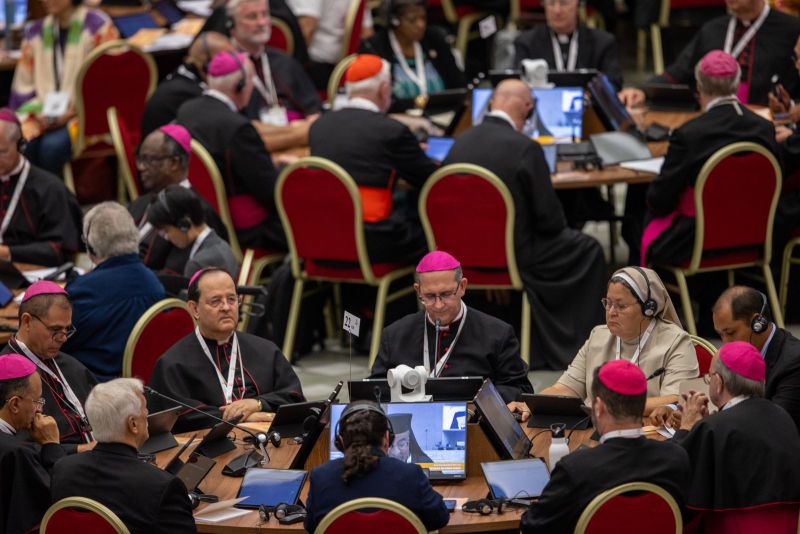 Synod on Synodality delegates in small groups listen to Pope Francis’ guidance for the upcoming weeks on Oct. 4, 2023. / Credit: Daniel Ibañez/CNA
Synod on Synodality delegates in small groups listen to Pope Francis’ guidance for the upcoming weeks on Oct. 4, 2023. / Credit: Daniel Ibañez/CNA
Vatican City, Oct 16, 2023 / 09:02 am (CNA).
As the Synod on Synodality hits the halfway mark for this year, the two Chinese bishops’ experience on the international religious stage is prematurely drawing to an end.
The Vatican confirmed Monday that the bishops from the People’s Republic of China are leaving ahead of the event’s conclusion, planning to return to their homeland early this week.
In answer to a question by CNA at the press briefing on Oct. 16, Paolo Ruffini, prefect of the Dicastery for Communication, said this was because of “pastoral needs in their diocese that require their presence.”
The attendance of the two prelates at the synod raised a series of questions of no minor importance.
Now entering its third and penultimate week, the synod will see a summary by the relator general — Jesuit Cardinal Jean-Claude Hollerich of Luxembourg — on Oct. 18, likely to be delivered live. This will be followed by the commission’s first meeting for drafting the summary report on Sunday, Oct. 22, as the Synod on “Communion, Mission, Participation” prepares for its final and decisive week.
Chinese bishops’ synodal journey
The participation of bishops from mainland China is not unprecedented. Following the 2018 agreement between the Holy See and Beijing regarding bishop appointments, two Chinese prelates were welcomed at the synod.
In this year’s synod, the government-selected bishops Joseph Yang Yongqiang of Zhoucun (Shandong province) and 58-year-old Anthony Yao Shun of Jining (Inner Mongolia province) represented China. Notably, Yao was among the first bishops ordained following the 2018 provisional agreement.
Both bishops are members of the Catholic Patriotic Association, the state-managed nationalistic organization of Catholicism in the People’s Republic of China, with Yao having served as the spiritual director of the National Seminary of the Patriotic Catholic Church and as a prominent member of the Liturgical Commission of the Patriotic Church. Conversely, at the time of the 2018 Sino-Vatican agreement, Yang held the position of vice president of the Patriotic Association.
Remarkably, the episcopal consecration of both bishops had received clandestine approval from Benedict XVI in Rome in 2010.
Alongside them, Cardinal Stephen Chow, bishop of Hong Kong, and Bishop Norbert Pu of Kiayi (Taiwan) were present. These four constituted the “Chinese patrol” at the synod, with Cardinal Luis Antonio Tagle, pro-prefect of the Dicastery for Evangelization, also reportedly engaging with them. The Filipino cardinal’s mother is of Chinese descent.
Broader interactions with the Holy See
China’s involvement is critical for Pope Francis. Cardinal Chow is expected to host a group from Beijing following his recent unprecedented visit to the capital area, the first by a Hong Kong bishop in over three decades.
The synod saw the representation of two Chinese bishops as a subtle warming in Holy See-China relations.
Throughout the COVID-19 pandemic, representation from mainland China in various Asian Church initiatives remained absent. Last year, the commemoration of the 50th anniversary of the Federation of Asian Bishops’ Conferences in Bangkok saw no delegate from mainland China.
The forthcoming week sees the synod gearing up for Sunday when the Commission for the Drafting of the Final Summary convenes for the first time. The commission aims to craft a comprehensive text reflecting the discussions, encapsulating inputs from smaller circles and independent interventions.
On the evening of Oct. 17, the reports from the “minor circles” or small discussion groups will be finalized, with discussions on module B3 of the Instrumentum Laboris concerning “Participation, tasks of responsibility, and authority in a missionary synodal Church” slated for Oct. 18.
A prayer event for migrants and refugees is scheduled on Oct. 19 in St. Peter’s Square, with smaller circles revisiting the B3 reports on Oct. 21.
The commission for drafting the synthesis report reconvenes on Oct. 22 with a follow-up meeting on Oct. 25.
Prayer service to focus on migration
The migrant prayer event on Oct. 19 highlights the recurring theme of migration. His Beatitude Sviatoslav Shevchuk, major archbishop of the Ukrainian Greek Catholic Church, voiced the plight of millions who have fled Ukraine.
Synodality is another focal point, with many prelates valuing the insights of Eastern-rite bishops. The synod encourages personal dialogues and spiritual discernment, stimulating debates on the assembly’s conduct.
The anecdote from a prelate likened adjusting to new methods to “wearing new trousers” — it’s initially uncomfortable compared with the familiar old pair.
Despite a hiccup last week when a cloud error exposed the minor circles’ reports online, Pope Francis’ call for prudence and confidentiality remains paramount, ensuring the essence of discussions remains within the holy confines.
